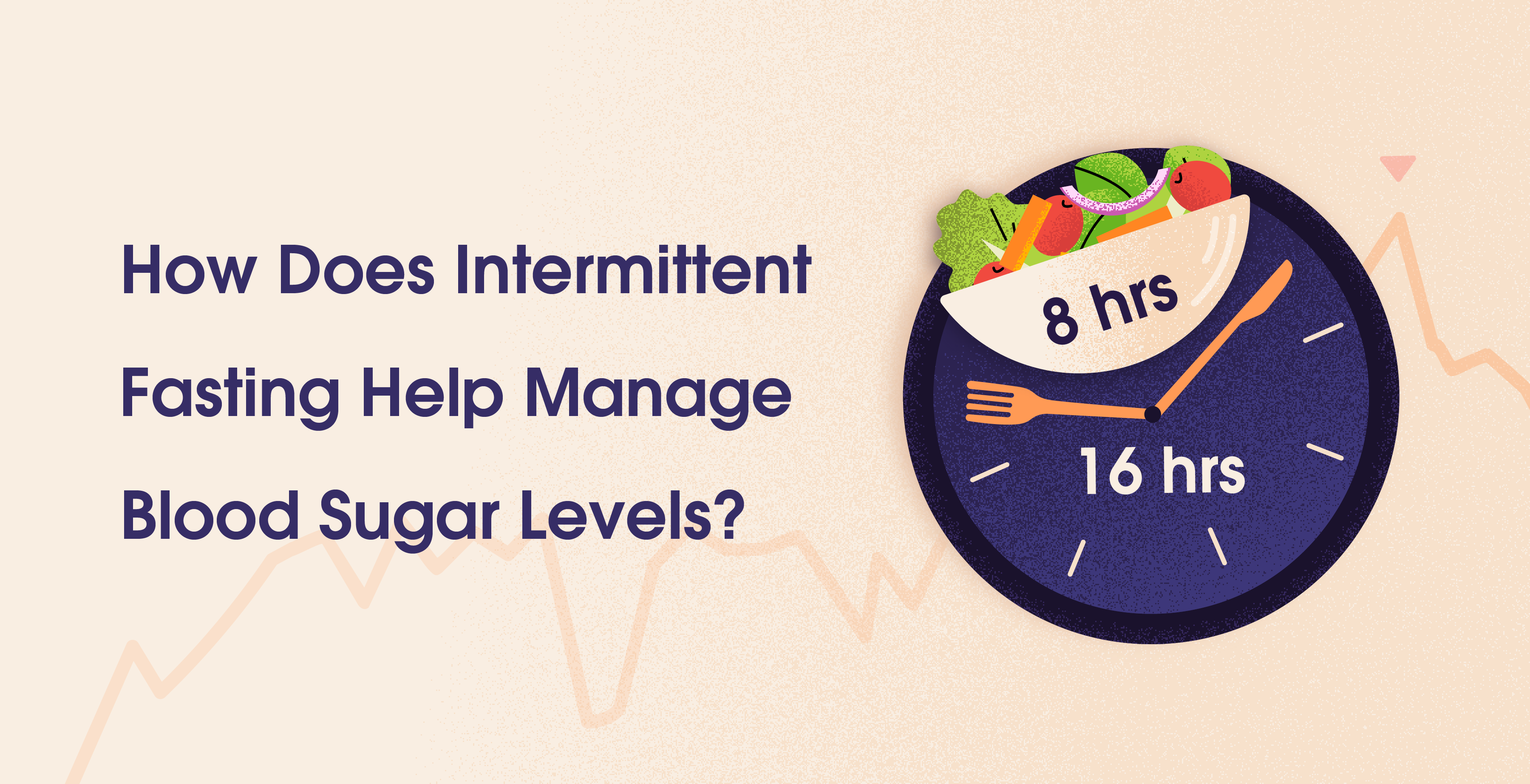Weight Management for Prediabetes
Mar 27, 2024
Ashima Raizada



Table Of Contents
Imagine this: you take a routine blood test, and the results come back with a diagnosis of prediabetes. It can be a shock, a wake-up call, or even a source of confusion. But before you get overwhelmed, let's unpack this together.
Prediabetes, simply put, is a condition where your blood sugar levels are higher than normal, but not quite high enough to be classified as type 2 diabetes. The good news? With proactive weight management strategies, you can significantly reduce your risk of developing full-blown diabetes and improve your overall health.
Highlights
Prediabetes is a prevalent condition affecting millions of adults. Losing even a modest amount of weight (5-7%) can significantly reduce your risk of developing type 2 diabetes.
Weight management for prediabetes goes beyond just reducing calories. Shedding excess fat, particularly around the abdomen, is crucial for improving insulin sensitivity and lowering blood sugar levels.
There are innovative strategies to boost weight loss efforts for prediabetes, such as incorporating low-glycemic carbs, exploring intermittent fasting (consult your doctor first), and practicing mindful eating.
Celebrating your victories, no matter how small, is key to maintaining long-term motivation and success in weight management for prediabetes.
Prediabetes in the USA
Here's the thing: prediabetes affects a staggering number of people. According to a 2020 study published in the National Institutes of Health (NIH) journal Diabetes Care, over 84 million adults in the United States have prediabetes, translating to roughly one in three adults. That's a significant chunk of the population, and more importantly, a significant opportunity for intervention.
Numerous studies have consistently highlighted the undeniable connection between obesity and prediabetes. A seminal research paper published in the Journal of the American Medical Association (JAMA) underscored the profound impact of even modest weight loss on reducing the risk of progression from prediabetes to type 2 diabetes. The study revealed that individuals who lost just 5-7% of their body weight experienced a significant reduction in their risk of developing this chronic condition.
Link Between Weight and Prediabetes
So, how exactly does weight management play a role in prediabetes? Let's delve a little deeper. When we consume food, our bodies break it down into glucose (sugar) for energy. Insulin, a hormone produced by the pancreas, acts like a key, unlocking cells to allow glucose entry. In prediabetes, your body either doesn't produce enough insulin, or your cells become resistant to its effects. This leads to a buildup of glucose in the bloodstream, hence the elevated blood sugar levels. When overweight or obese, cells become less responsive to insulin, causing blood sugar levels to rise - a hallmark of prediabetes and type 2 diabetes if left unchecked. Abdominal visceral fat, in particular, releases compounds that impair insulin's ability to regulate blood sugar effectively.
Moreover, obesity often coexists with an unhealthy diet, physical inactivity, and sedentary behavior - lifestyle factors that exacerbate insulin resistance and dysregulated blood sugar control.
Tips on Weight Management for Prediabetes
Here's where weight management steps in. Excess body fat, particularly around the abdominal area, can significantly impair insulin sensitivity. Research published in the journal Cell Metabolism in 2018 found a direct link between visceral fat (fat around the organs) and insulin resistance. The takeaway? Shedding some pounds can significantly improve insulin function and lower your blood sugar levels.
While the core principles of weight management for prediabetes remain sound (diet, exercise, portion control), there's room to explore some innovative and less conventional strategies to boost your efforts. Here are a few ideas to consider:
Spice up your metabolism with smart carbs
Go beyond simply reducing carbs. Look for low-glycemic options that have a minimal impact on blood sugar. Explore options like resistant starches found in green bananas, lentils, and beans. These starches resist digestion in the small intestine, promoting satiety and improving insulin sensitivity according to a 2019 study published in the journal Nutrients.
Embrace the power of intermittent fasting
This approach involves cycling between periods of eating and fasting. Studies like a 2017 review published in The Lancet show promise for prediabetes management. Intermittent fasting can improve insulin sensitivity and promote weight loss. However, it's crucial to consult your doctor before starting this approach, especially if you have any underlying health conditions.
Get a good night's sleep for weight loss
7-8 hours of quality sleep each night. A 2018 study in the journal Diabetes Care demonstrated a link between poor sleep and increased risk of prediabetes. Prioritize sleep hygiene by establishing a regular sleep schedule, creating a relaxing bedtime routine, and limiting screen time before bed.
Mindful eating practice
Mindful eating practices can help you become more aware of hunger cues, portion sizes, and emotional triggers for overeating. Studies like a 2019 review published in the journal Appetite suggest that mindfulness-based interventions can promote weight loss and improve eating habits. Try mindful eating exercises like focusing on the taste, texture, and aroma of your food while chewing slowly and savoring each bite.
Move beyond the gym:
Explore Fun and Functional Fitness: Traditional gym routines may not be for everyone. Explore alternative exercise options that are enjoyable and sustainable. Consider activities like dance classes, rock climbing, martial arts, or team sports. Engaging in activities you genuinely enjoy increases the likelihood of sticking with them long-term.
Leverage technology for support:
There's a wealth of health and fitness apps available. Utilize them for tracking calorie intake, creating meal plans, finding workout routines, or connecting with virtual communities for support. Explore apps that offer personalized coaching or gamified challenges to keep you motivated.
Eat prebiotics and probiotics:
Studies suggest a gut microbiome imbalance might play a role in insulin resistance. Consider incorporating prebiotics (foods rich in fiber that feed good gut bacteria) like asparagus, onions, and whole grains, and probiotics (foods or supplements containing live bacteria) like yogurt and kimchi into your diet. Research is ongoing, but these dietary changes might offer additional benefits for weight management and prediabetes control.
Stress less, slim down:
Chronic stress elevates cortisol levels, a hormone that can promote weight gain and blood sugar fluctuations. Practice stress management techniques like yoga, meditation, deep breathing exercises, or spending time in nature. Reducing stress can not only improve your overall well-being but also support your weight management goals.
Explore the potential of telehealth support:
Telehealth consultations with registered dietitians or certified diabetes educators can provide valuable guidance and support for weight management with prediabetes. This approach offers flexibility and convenience, making it easier to stay on track with your goals.
Celebrate Your Victories
Researchers at the University of California, Los Angeles (UCLA) conducted a longitudinal study on the impact of celebrating small achievements on weight loss success. The study revealed that individuals who acknowledged and celebrated their incremental progress, no matter how modest, were more likely to maintain their motivation and sustain their weight management efforts over the long term.
Remember, consistency is key. By incorporating these innovative strategies alongside the core principles of healthy eating and exercise, you can create a sustainable weight management program that empowers you to take control of your prediabetes and improve your overall health.
Frequently Asked Questions
What is the best way to lose weight in prediabetes?
Combine healthy eating (focus on fiber, lean protein), exercise (aim for 150 minutes moderate intensity weekly), and portion control. It's a multi-pronged approach!
What is the best weight loss medication for prediabetes?
Talk to your doctor! Medication might be an option, but lifestyle changes are usually the first line of defense.
How much weight do you need to lose to cure prediabetes?
Aim for 7% of your body weight. Even that can significantly improve your blood sugar control.
Is it harder to lose weight if you are prediabetic?
Not necessarily! Prediabetes is a wake-up call to focus on healthy habits. By making changes, you can improve insulin sensitivity and potentially lose weight easier.
Which exercise is best for prediabetes?
Find something you enjoy! Brisk walking, swimming, cycling - anything that gets you moving for at least 150 minutes a week is great.
What is the fastest way to reverse prediabetes?
Focus on consistent lifestyle changes. There's no quick fix, but with dedication, you can significantly improve your health and potentially reverse prediabetes.
References
Imagine this: you take a routine blood test, and the results come back with a diagnosis of prediabetes. It can be a shock, a wake-up call, or even a source of confusion. But before you get overwhelmed, let's unpack this together.
Prediabetes, simply put, is a condition where your blood sugar levels are higher than normal, but not quite high enough to be classified as type 2 diabetes. The good news? With proactive weight management strategies, you can significantly reduce your risk of developing full-blown diabetes and improve your overall health.
Highlights
Prediabetes is a prevalent condition affecting millions of adults. Losing even a modest amount of weight (5-7%) can significantly reduce your risk of developing type 2 diabetes.
Weight management for prediabetes goes beyond just reducing calories. Shedding excess fat, particularly around the abdomen, is crucial for improving insulin sensitivity and lowering blood sugar levels.
There are innovative strategies to boost weight loss efforts for prediabetes, such as incorporating low-glycemic carbs, exploring intermittent fasting (consult your doctor first), and practicing mindful eating.
Celebrating your victories, no matter how small, is key to maintaining long-term motivation and success in weight management for prediabetes.
Prediabetes in the USA
Here's the thing: prediabetes affects a staggering number of people. According to a 2020 study published in the National Institutes of Health (NIH) journal Diabetes Care, over 84 million adults in the United States have prediabetes, translating to roughly one in three adults. That's a significant chunk of the population, and more importantly, a significant opportunity for intervention.
Numerous studies have consistently highlighted the undeniable connection between obesity and prediabetes. A seminal research paper published in the Journal of the American Medical Association (JAMA) underscored the profound impact of even modest weight loss on reducing the risk of progression from prediabetes to type 2 diabetes. The study revealed that individuals who lost just 5-7% of their body weight experienced a significant reduction in their risk of developing this chronic condition.
Link Between Weight and Prediabetes
So, how exactly does weight management play a role in prediabetes? Let's delve a little deeper. When we consume food, our bodies break it down into glucose (sugar) for energy. Insulin, a hormone produced by the pancreas, acts like a key, unlocking cells to allow glucose entry. In prediabetes, your body either doesn't produce enough insulin, or your cells become resistant to its effects. This leads to a buildup of glucose in the bloodstream, hence the elevated blood sugar levels. When overweight or obese, cells become less responsive to insulin, causing blood sugar levels to rise - a hallmark of prediabetes and type 2 diabetes if left unchecked. Abdominal visceral fat, in particular, releases compounds that impair insulin's ability to regulate blood sugar effectively.
Moreover, obesity often coexists with an unhealthy diet, physical inactivity, and sedentary behavior - lifestyle factors that exacerbate insulin resistance and dysregulated blood sugar control.
Tips on Weight Management for Prediabetes
Here's where weight management steps in. Excess body fat, particularly around the abdominal area, can significantly impair insulin sensitivity. Research published in the journal Cell Metabolism in 2018 found a direct link between visceral fat (fat around the organs) and insulin resistance. The takeaway? Shedding some pounds can significantly improve insulin function and lower your blood sugar levels.
While the core principles of weight management for prediabetes remain sound (diet, exercise, portion control), there's room to explore some innovative and less conventional strategies to boost your efforts. Here are a few ideas to consider:
Spice up your metabolism with smart carbs
Go beyond simply reducing carbs. Look for low-glycemic options that have a minimal impact on blood sugar. Explore options like resistant starches found in green bananas, lentils, and beans. These starches resist digestion in the small intestine, promoting satiety and improving insulin sensitivity according to a 2019 study published in the journal Nutrients.
Embrace the power of intermittent fasting
This approach involves cycling between periods of eating and fasting. Studies like a 2017 review published in The Lancet show promise for prediabetes management. Intermittent fasting can improve insulin sensitivity and promote weight loss. However, it's crucial to consult your doctor before starting this approach, especially if you have any underlying health conditions.
Get a good night's sleep for weight loss
7-8 hours of quality sleep each night. A 2018 study in the journal Diabetes Care demonstrated a link between poor sleep and increased risk of prediabetes. Prioritize sleep hygiene by establishing a regular sleep schedule, creating a relaxing bedtime routine, and limiting screen time before bed.
Mindful eating practice
Mindful eating practices can help you become more aware of hunger cues, portion sizes, and emotional triggers for overeating. Studies like a 2019 review published in the journal Appetite suggest that mindfulness-based interventions can promote weight loss and improve eating habits. Try mindful eating exercises like focusing on the taste, texture, and aroma of your food while chewing slowly and savoring each bite.
Move beyond the gym:
Explore Fun and Functional Fitness: Traditional gym routines may not be for everyone. Explore alternative exercise options that are enjoyable and sustainable. Consider activities like dance classes, rock climbing, martial arts, or team sports. Engaging in activities you genuinely enjoy increases the likelihood of sticking with them long-term.
Leverage technology for support:
There's a wealth of health and fitness apps available. Utilize them for tracking calorie intake, creating meal plans, finding workout routines, or connecting with virtual communities for support. Explore apps that offer personalized coaching or gamified challenges to keep you motivated.
Eat prebiotics and probiotics:
Studies suggest a gut microbiome imbalance might play a role in insulin resistance. Consider incorporating prebiotics (foods rich in fiber that feed good gut bacteria) like asparagus, onions, and whole grains, and probiotics (foods or supplements containing live bacteria) like yogurt and kimchi into your diet. Research is ongoing, but these dietary changes might offer additional benefits for weight management and prediabetes control.
Stress less, slim down:
Chronic stress elevates cortisol levels, a hormone that can promote weight gain and blood sugar fluctuations. Practice stress management techniques like yoga, meditation, deep breathing exercises, or spending time in nature. Reducing stress can not only improve your overall well-being but also support your weight management goals.
Explore the potential of telehealth support:
Telehealth consultations with registered dietitians or certified diabetes educators can provide valuable guidance and support for weight management with prediabetes. This approach offers flexibility and convenience, making it easier to stay on track with your goals.
Celebrate Your Victories
Researchers at the University of California, Los Angeles (UCLA) conducted a longitudinal study on the impact of celebrating small achievements on weight loss success. The study revealed that individuals who acknowledged and celebrated their incremental progress, no matter how modest, were more likely to maintain their motivation and sustain their weight management efforts over the long term.
Remember, consistency is key. By incorporating these innovative strategies alongside the core principles of healthy eating and exercise, you can create a sustainable weight management program that empowers you to take control of your prediabetes and improve your overall health.
Frequently Asked Questions
What is the best way to lose weight in prediabetes?
Combine healthy eating (focus on fiber, lean protein), exercise (aim for 150 minutes moderate intensity weekly), and portion control. It's a multi-pronged approach!
What is the best weight loss medication for prediabetes?
Talk to your doctor! Medication might be an option, but lifestyle changes are usually the first line of defense.
How much weight do you need to lose to cure prediabetes?
Aim for 7% of your body weight. Even that can significantly improve your blood sugar control.
Is it harder to lose weight if you are prediabetic?
Not necessarily! Prediabetes is a wake-up call to focus on healthy habits. By making changes, you can improve insulin sensitivity and potentially lose weight easier.
Which exercise is best for prediabetes?
Find something you enjoy! Brisk walking, swimming, cycling - anything that gets you moving for at least 150 minutes a week is great.
What is the fastest way to reverse prediabetes?
Focus on consistent lifestyle changes. There's no quick fix, but with dedication, you can significantly improve your health and potentially reverse prediabetes.
References
Table Of Contents
Table Of Contents
Table Of Contents
Read More


Mar 25, 2025
Sayfali Rawlani


Mar 20, 2025
Sayfali Rawlani


Mar 6, 2025
Sayfali Rawlani



Company
Copyright © 2025 trst health. All right reserved.

